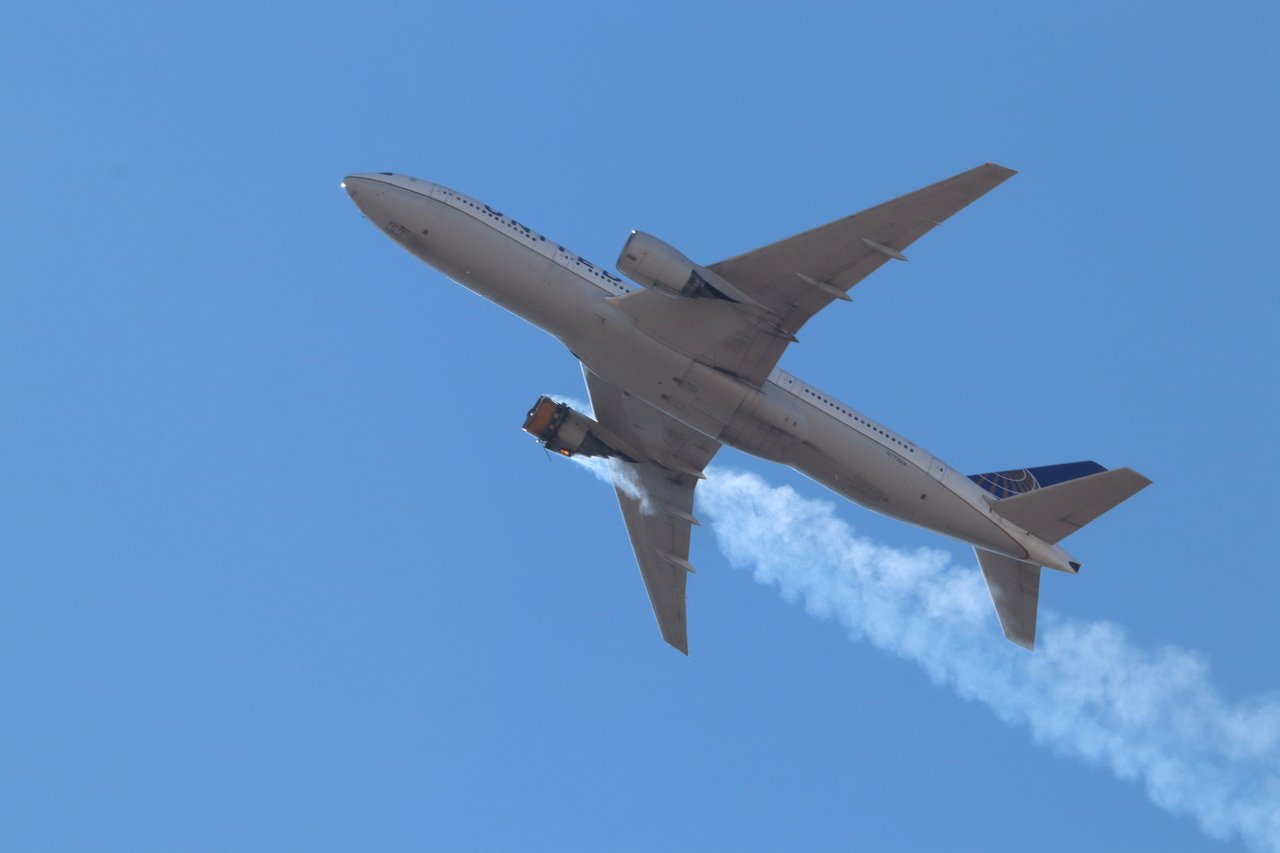Boeing calls for grounding of some 777s after Denver engine fire
Sign up now: Get ST's newsletters delivered to your inbox

United Airlines flight 328 with an engine on fire, flying over Denver, Colorado, on Feb 20, 2021.
PHOTO: EPA-EFE/HAYDEN SMITH
WASHINGTON (AFP, REUTERS, BLOOMBERG) - Boeing has called for the grounding of 128 of its 777 planes across the world as US regulators investigated a United Airlines flight whose engine caught fire and fell apart over a suburban American community.
United, South Korea's Asiana and Japan's two main airlines - Japan Airlines (JAL) and All Nippon Airways (ANA) - confirmed they had already suspended operations of 63 planes fitted with the same family of engine which scattered debris over Denver on Saturday.
The US National Transportation and Safety Board (NTSB) is also investigating the incident, in which no one was hurt.
Boeing warned that similarly fitted planes should be taken out of service until the US Federal Aviation Authority (FAA) had determined an inspection procedure.
"While the NTSB investigation is ongoing, we recommended suspending operations of the 69 in-service and 59 in-storage 777 aircraft powered by Pratt & Whitney 4000-112 engines," Boeing said.
The announcements came after a United Airlines' Boeing-777 aircraft landed safely at Denver International Airport last Saturday (Feb 20) after its right engine failed.
The incident on United Airlines Flight 328 from Denver to Honolulu took place shortly after it took off with 231 passengers and 10 crew members.
United said the next day it would voluntarily and temporarily remove its 24 active planes, hours before Boeing's announcement.
The 777-200s and 777-300s affected are older and less fuel efficient than newer models and most operators are phasing them out of their fleets.
Images posted by police in Broomfield, Colorado showed significant plane debris on the ground, including an engine cowling scattered outside a home and what appeared to be other parts in a field.
The NTSB said its initial examination of the plane indicated that most of the damage was confined to the right engine, with only minor damage to the airplane.
It said the inlet and casing separated from the engine and two fan blades were fractured, while the remainder of the fan blades exhibited damage.
Japan's transport ministry ordered JAL and ANA Holdings to suspend the use of 777s with PW4000 engines while it considered whether to take additional measures.
Japan said ANA operated 19 of the type and JAL operated 13 of them, though the airlines said their use had been reduced during the pandemic. JAL said its fleet was due for retirement by March 2022.
The ministry said that on Dec 4, 2020, a JAL flight from Naha Airport to Tokyo International Airport returned to the airport due to a malfunction in the left engine about 100km north of Naha Airport.
That plane was the same age as the 26-year-old United Airlines plane involved in the latest incident.
Asiana Airlines, South Korea's second-largest carrier, said it would not fly any of its seven currently operational 777s.
"We are still waiting for instructions from South Korea's transport ministry on inspections but we are taking preemptive measures by gradually switching aircraft," a spokesman said.
Flag carrier Korean Air added it was awaiting an official directive from South Korean regulators "and will follow the directions once confirmed". The airline said it had 16 of the planes, 10 of them stored, and it would consult with the manufacturer and regulators and stop flying them to Japan for now.
A spokesman for South Korea's transport ministry, speaking before Boeing recommended suspending operations, said it was monitoring the situation but had not yet taken any action.
United is the only US operator of the planes, according to the FAA.
"We reviewed all available safety data," the FAA said in a statement. "Based on the initial information, we concluded that the inspection interval should be stepped up for the hollow fan blades that are unique to this model of engine, used solely on Boeing 777 airplanes."
In February 2018, a 777 of the same age operated by United and bound for Honolulu suffered an engine failure when a cowling fell off about 30 minutes before the plane landed safely. The NTSB determined that incident was the result of a full-length fan blade fracture.
Because of that 2018 incident, Pratt & Whitney reviewed inspection records for all previously inspected PW4000 fan blades, the NTSB said. The FAA in March 2019 issued a directive requiring initial and recurring inspections of the fan blades on the PW4000 engines.
Pratt & Whitney, owned by Raytheon Technologies, said it was coordinating with operators and regulators to support a revised inspection interval for the engines.


